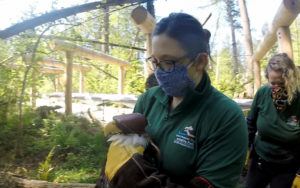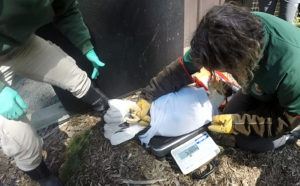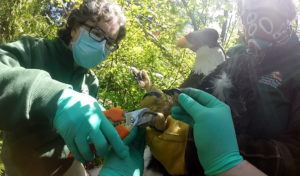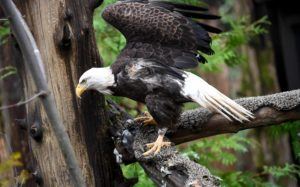
Even America’s most iconic symbol needs vaccinations to stay healthy.
At Northwest Trek this spring, all four bald eagles received their annual shots against West Nile virus, keeping them – and the human population – safer from the disease. But the vaccination visit to Eagle Passage was also a great opportunity for the veterinary team to check up on Sucia, Salish, Sequoia and Cheveyo, getting weights, trimming beaks and nails and making sure everyone was doing well.
The fun part for us? Veterinarian Dr. Allison Case decided to put on a chest Go-Pro while she worked, giving fans an eagle-eye view of the proceedings.
First, find your eagle
For eagle exams, the first tricky part is actually finding the eagle. Eagle Passage, an immersive walk-through habitat that opened last year, has a lot of vertical space for our birds to explore. When keepers or veterinary staff need to care for the birds, they use an enclosed walk-in space behind the exhibit.
Luckily, when Dr. Case walked inside, her first patient was waiting there for her! After that, keepers Wendi Mello and Miranda Mauck gently scooped up each eagle in a soft net, then held them to their chest for the exam. Long leather gloves protected her hands, and a soft hood slipped over the birds’ heads to keep them calm one by one during the short procedure.
Be brave, now

The next part of each exam was the vaccination against West Nile virus. A flavivirus in the same family as the Zika virus, West Nile was first found in the U.S. in 1999 in New York City, discovered by a zoo veterinarian studying local crows. It spreads via mosquitos, but was carried to the West Coast in around 2002 by infected birds, according to Washington State University Extension. Although humans, horses and other species can get West Nile virus, with results ranging from asymptomatic to fatal, they aren’t particularly good spreading hosts.
But birds are – and that’s where vaccination comes in. Every spring, all birds at Northwest Trek get their vaccines, and keepers make sure habitats are free of the standing water that mosquitoes love to breed in.
“It’s all about keeping everyone safe,” said Dr. Case.
Meanwhile, veterinary technician Tracy Cramer carefully injected the vaccine into each eagle, who rested calmly in Mello’s arms.
Weight, beak, nails

After that, each exam went swiftly. The team took weights, wrapping each bird snugly in a towel to keep them safe on the scale. Sequoia, the juvenile, was the biggest at 165 ounces. Then came Sucia at 133.6, Cheveyo at 123.8 and Salish (the male) at 121.3. (Keepers also weigh regularly, to check the birds’ ongoing health.)
Dr. Case checked feet, trimmed some nails with big clippers, and did a little beak coping for a healthy mouth shape. She paid special attention to Cheveyo, an eagle with one amputated wing, to make sure she was in great shape.
“Wendi has made wonderful branch and twig barriers to keep the other birds from coming into Cheveyo’s space,” Dr. Case explained. “But with only one wing, Cheveyo is challenged with balancing. We want to make sure she’s comfortable. She’s improved so much since she arrived.”
Ambassadors with disabilities

All four eagles have disabilities. They were rescued separately with wing injuries that prevented them from surviving in the wild, and given a home at Northwest Trek. Now they’re ambassadors for this iconic American species, which was brought back from the brink of extinction by community action.
“Our bald eagles are in great shape, healthy and strong,” summed up Dr. Case, who’ll visit the birds regularly and vaccinate again next spring.
Out in Eagle Passage, all four birds perched quietly, taking in the morning.